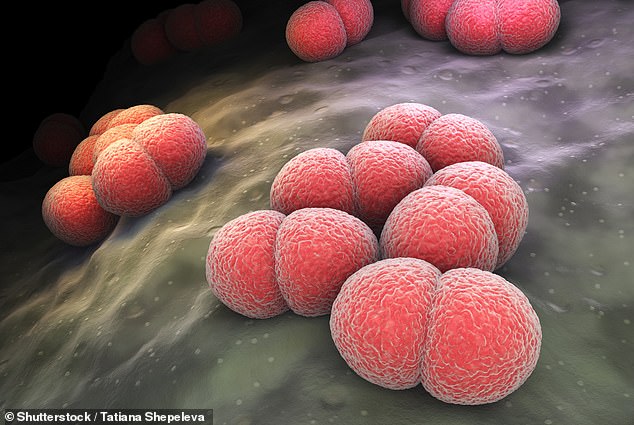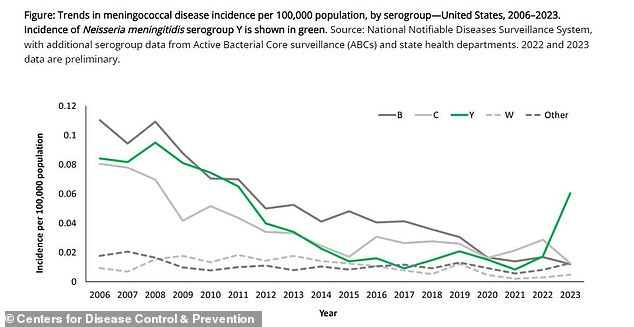<!–
<!–
<!– <!–
<!–
<!–
<!–
Health officials have warned doctors to be on the lookout for a rare bacterial infection that kills one in six patients.
The CDC on Thursday issued an alert to doctors about rising cases of a type of strain that causes meningitis that is increasing rapidly in the US.
The agency found that there have already been 143 infections caused by the bacteria Neisseria meningitidis of the Y subgroup ST-1466, 80 percent more than this time last year.
This form is different from the more common types, which usually causes a stiff neck and high fever and kills one in 10 people.

The CDC on Thursday issued an alert to doctors about increasing cases of a form of invasive meningococcal disease, caused by a strain of Neisseria meningitidis bacteria known as ST-1466.


Last year, 422 Neisseria meningitidis illnesses were reported in the U.S., the highest number since 2014. And in 2024 alone, 143 cases were identified, 80 percent more than this time last year.
Instead, this rapidly increasing strain causes blood infections and joint stiffness, which doctors have been warned to watch out for.
Neisseria meningitidis can be transmitted from person to person through saliva and respiratory secretions, such as by kissing, coughing, sneezing, or living in close contact with other infected people.
Last year, 422 Neisseria meningitidis illnesses were reported in the US, the highest number since 2014.
There are four subgroups of meningococcal bacteria circulating in the US: B, C, W and Y. The CDC said ST-1466 is in the Y subgroup.
About 65 percent of cases have occurred in adults between 30 and 60 years old, the majority of whom were black (63 percent).
Another 15 percent were patients with HIV, which has been shown to increase the risk of meningococcal disease.
The agency said at least 17 patients died.
Meningococcal disease usually manifests as meningitis, an inflammation of the protective membranes that cover the brain and spinal cord.
Symptoms include high fever, severe headache, stiff neck, nausea, vomiting, difficulty concentrating, seizures, drowsiness, sensitivity to light, or lack of appetite.
Meningitis is responsible for between 150 and 300 deaths per year in the United States.
However, the CDC urged doctors to watch for unusual symptoms, such as blood infections and joint pain.
The agency warned that symptoms can worsen within hours and that prompt treatment with antibiotics is essential.
There are also vaccines to protect against meningococcal disease, which authorities recommend for children ages 11 to 12.
Protection wears off, so a booster dose is usually given at age 16.
Officials also urge people with compromised immune systems, such as HIV, to receive a booster dose every three to five years.
The CDC alert comes after five people in Virginia died from this form of meningococcal disease in September.
